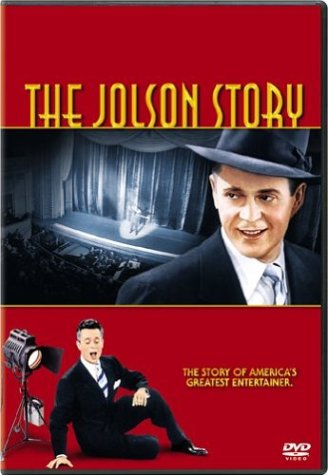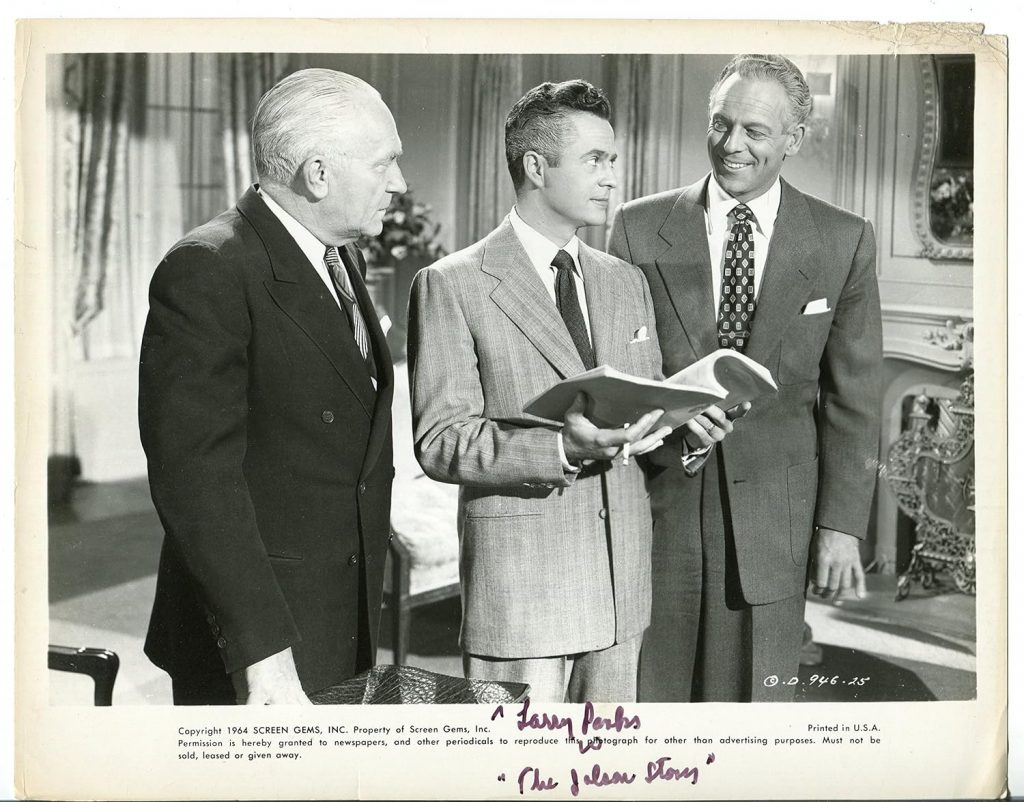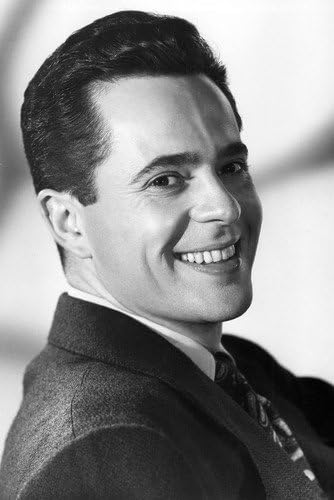movie review of “The Jolson Story”, a fictionalized account of the life story of Al Jolson, played by Larry Parks (with the actual singing done by Al Jolson himself) with loads of music, and a massive success when it was released.
The Jolson Story (1946) starring Larry Parks, William Demarest, Evelyn Keyes
![]() A very enjoyable movie, The Jolson Story is a heavily fictionalized version of Al Jolson’s life story. For example, Jolson’s manager Steve Martin (played wonderfully by William Demarest) is a composite—in real life, Al Jolson had several managers over his lifetime. Likewise, he had four marriages, and the fictional “Julie Benson” takes the place of his third wife, singer and dancer Ruby Keeler—who refused to let her name be used in the movie. Despite the lack of accuracy, The Jolson Storyis a very entertaining musical, recounting the (fictionalized) childhood of Al Jolson, how he became interested in music and show business, and his rise to fame and fortune.
A very enjoyable movie, The Jolson Story is a heavily fictionalized version of Al Jolson’s life story. For example, Jolson’s manager Steve Martin (played wonderfully by William Demarest) is a composite—in real life, Al Jolson had several managers over his lifetime. Likewise, he had four marriages, and the fictional “Julie Benson” takes the place of his third wife, singer and dancer Ruby Keeler—who refused to let her name be used in the movie. Despite the lack of accuracy, The Jolson Storyis a very entertaining musical, recounting the (fictionalized) childhood of Al Jolson, how he became interested in music and show business, and his rise to fame and fortune.
Early life
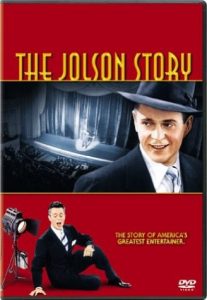
The Jolson Story begins with a vaudeville performer, Steve Martin (played well by veteran actor William Demarest) doing a comedy music act at a local burlesque theater, when he asks the audience to sing along with a song—the only person that does is a young man, Asa Yoelson, who sings with a beautiful voice. He dashes off afterward, as he’s late for service at the local Synagogue, where his father is cantor. Later, at home, his father (and mother) are asking him why he was so late, when Steve Martin appears, wanting to take young Asa on the vaudeville circuit, with the approval of his parents. Papa and Mama Yoelson do not approve, however, and Steve Martin leaves.
Asa, however, has found his life’s calling, and he runs away, to join Mr. Martin at his next city. He’s caught by a police officer, and taken to a Catholic institution, where both Steve Martin and the boy’s parents are called. Steve Martin explains to young Asa that he would never take him along without the parents’ approval—and, with the aid of the Catholic priest,Asa is able to get permission from his parents, and begin his journey as a showman.
Performing
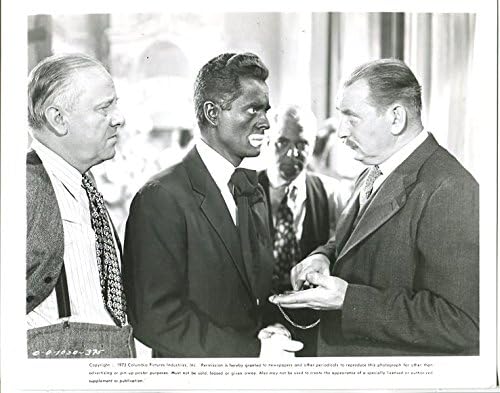
After time, and Asa’s voice changing, Asa is promoted to Martin’s partner, and changes his name … to Al Jolson. Martin and Jolson are a success, and one night Al (now being portrayed by Larry Parks) fills in for an inebriated fellow performer, taking his place on stage as a black face minstrel—and gets an opportunity to join a prominent minstrel troupe, run by Mr. Dockstader. Although Al refuses to break up his partnership with Steve Martin, Steve selflessly arranges for Al to do so … putting Al’s career ahead of his own, not for the first, or last, time.
While touring with the minstrel group in New Orleans, Al is exposed for the first time to Jazz music, and begins singing with a local Jazz group … again losing track of the time, leading him to be severely late for his own performance … and being fired by Mr. Dockstader. This becomes a blessing in disguise, as Steve Martin again pulls strings on Al’s unknowing behalf, and Al gets a break on Broadway. Soon, Al pushes the envelope again, risking his career—and winning. Al Jolson becomes the darling of Broadway, and repays a debt by making Steve Martin his personal manager. Professional success is piled on professional success, but his personal life is empty, until he meets the beautiful Julie Benson (played by Evelyn Keyes), a Ziegfeld singer/dancer.
Love at first sight
For Al, it’s love at first sight, and within hours of meeting Julie, he proposes to her. She doesn’t reciprocate his feelings (yet), and the two begin a long-distance romance as she works in her own stage show while Al Jolson flies out to film the first talking motion picture, The Jazz Singer. On the night of her new show’s opening, Al flies back to New York City to encourage her, only to “come to the rescue” when she’s struck by stage fright at her opening number. This opens Julie’s heart to him, and they begin falling in love. Soon after, Al has her come out to California to start her own motion picture career—and they soon elope, as well. All seems well at first, except for Al’s constant working. Eventually, Al decides to retire, in order to spend his life with Julie.
All seems well, although after two years Al Jolson seems restless — he no longer sings, not even for friends and family. Julie surprises them by flying Al’s parents out to California for a visit for their anniversary, and after prompting from his father, Al eventually relents and sings a beautiful romantic song while his parents dance. Later, against Al’s wishes, the group goes out to a nightclub to celebrate, where Al is asked to perform. Despite initial refusals, Al eventually relents, and soon begins performing like in the old days, coming to life again, and enjoying himself for the first time in a long time. Realizing that Al is miserable in retirement, Julie leaves the club, planning to leave Al Jolson so that he can return to his first love and be truly happy.
Conclusion
Although not historically accurate, The Jolson Story is a very enjoyable musical, crammed with great performances—both musical and acting. I strongly recommend it for fans of musicals; I rate it 3 stars out of 5.
Movie quotes from The Jolson Story
Steve Martin (William Demarest): Give that boy a spotlight!
Al Jolson (Larry Parks): [To Dockstader]I heard some music tonight. Something they call ‘jazz.’ The fellows just make it up as they go along. They pick it out of the air.
Al Jolson (Larry Parks): [I’m] trying to make songs out of music I picked up. Music nobody ever heard of before, but the only kind I want to sing.
Mama Yoelson: [to Papa Yoelson] Papa, Asa isn’t Asa any more!
Al Jolson (Larry Parks): [to audience in theater]: Settle back folks – you ain’t heard nothin’ yet!
Talking pictures
Al Jolson (Larry Parks): [to audience in theater]: I’m going into what they call talking pictures – don’t know what’s going to happen to me – but, if I come back you’ll let me … won’t you?
Mama Yoelson: What is sockeroo, Papa?
Papa Yoelson: Sockeroo? That’s double socko, Mama.
Al Jolson (Larry Parks): That’s an audience that never saw a live show. People in small towns who can afford a movie, where they can’t afford anything else. Audience of millions. I’d be singing to every one of them at the same time. That’s really something!
Performing
Al Jolson (Larry Parks): [to orchestra leader] Oscar, what are you doing with that phone – this is no time to call up women!
Al Jolson (Larry Parks): Tonight, folks, I’m only going to sing two thousand songs. One to a customer.
Al Jolson (Larry Parks): Broadway? What a street! You know something, baby? It belongs to me. You know something else? If you want, I’ll give it to you.
Trivia for The Jolson Story
- The film’s accuracy was severely compromised by the fact that Al Jolson’s third wife, Ruby Keeler, refused to allow her name to appear on screen.
- Mama Yoelson was already dead at the time Al became a star.
- In the long shot of Jolson performing on the “runway”, Al Jolson played himself; his only appearance in the film.
- When Jolson attends the premiere of The Jazz Singer (1927) we hear the soundtrack, but Warner Bros. – which owned the rights to “The Jazz Singer” – would not permit a visual clip to shown in this film, which was made by Columbia.
- Highest-grossing movie in America in 1946. This marked the first blockbuster hit for Columbia Pictures in it’s 20+ year history.
- When shooting the musical numbers, Larry Parks didn’t merely mouth the words to Al Jolson’s pre-recorded vocals, as was customary. Instead, he sang along to Jolson’s records in full voice so it would look like he was actually singing.
- In addition to the fee he received for selling the rights to his life story, Al Jolson also was paid $25,000 for recording the songs for the film.
- The soundtrack album, released in 1947, was the first of its kind for a film. The album consisted of several two sided 78s , all performed by Al Jolson, each in a sleeve, like pages in a book. LPs would not be introduced until 1949.
- Interestingly, the cover picture of “The Jolson Story” soundtrack album, consisted of a drawing of two hands with white gloves, with no reference to his, at times controversial, “black face” makeup.
Songs performed in The Jolson Story
- Let Me Sing and I’m Happy
- Banks of the Wabash
- Ave Maria
- When You Were Sweet Sixteen
- After the Ball
- By the Light of the Silvery Moon
- Blue Bell
- Ma Blushin’ Rosie
- I Want a Girl
- My Mammy
- I’m Sitting on Top of the World
- You Made Me Love You
- Swanee
- Toot, Toot, Tootsie! (Goo’ Bye)
- The Spaniard That Blighted My Life
- April Showers
- California, Here I Come
- Liza (All the Clouds’ll Roll Away)
- There’s a Rainbow ‘Round My Shoulder
- Avalon
- She’s a Latin from Manhattan
- About a Quarter to Nine
- Anniversary Song
- Waiting for the Robert E. Lee
- Rock-a-Bye Your Baby with a Dixie Melody
